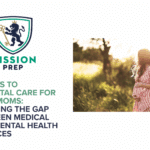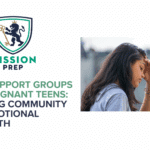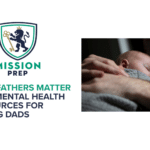Navigating High School While Pregnant: Academic and Emotional Support for Teens

Teen moms and graduation statistics in the U.S. reveal a troubling gap. Only about 50% of teen mothers earn a diploma, compared to nearly 90% of teens who don’t give birth.¹ This means many teen moms begin adulthood at an academic disadvantage. But it doesn’t have to be this way.
Education support for teen moms can make a real difference. With the right support system in place, including access to flexible academics, counseling, and parenting resources, balancing school and pregnancy becomes much more achievable.
Emotional support for pregnant teens is just as important. When educators and caregivers introduce coping strategies for pregnant teens, it can ease the mental and emotional weight of staying in school. If your child is pregnant in high school, there are compassionate, evidence-based ways to help.
At Mission Prep, we support the emotional well-being of students navigating both adolescence and pregnancy, so teen mothers can graduate with confidence. This guide can also help by shedding light on the following support for student moms:
- Educational rights for teen mothers
- Challenges of schooling while pregnant
- Coping strategies for pregnant teens
- Where to get mental health support for pregnant students

Educational Rights for Teen Mothers
Studies also show that a lack of education can lead to a poor quality of life.³ Keeping teens in school and motivated to learn is therefore better for their overall mental health. Fortunately, the majority of citizens and the government want to see pregnant students succeed academically.²
Teens pregnant in high school are protected under Title IX, a federal civil rights law that makes it illegal for schools to discriminate based on sex, including issues involving pregnancy.
Therefore, if your teen is expecting a baby or already parenting, the school can’t push them into separate classes or treat them differently. They still have the right to take part in regular classes, honors programs, school clubs, sports teams, and any other extracurriculars. If there’s a separate program for pregnant students, participation must be optional, and it has to offer the same quality of education.
Schools are also required to make reasonable adjustments when pregnancy creates new physical needs. This could include things like letting your teen use the elevator, take more restroom breaks, or have access to a larger desk. If a doctor recommends these changes, the school needs to follow through.
Time off for childbirth or pregnancy-related medical needs is also a consideration, and your teen has the right to return to class without penalty. Teachers can’t dock grades for missed participation or block makeup work if the absences were medically necessary.
Every federally funded school is required to have a Title IX coordinator; someone whose job is to make sure these rights are upheld. So, if something feels unfair or your child isn’t receiving the teen pregnancy academic help they deserve, you can raise concerns with this coordinator or file a complaint through the U.S. Department of Education’s Office for Civil Rights.
Challenges of Schooling While Pregnant
High school is demanding, and being pregnant can make it even more complicated. Some of the biggest challenges that affect emotional well-being in pregnant teens include:
- Constant fatigue and physical discomfort: It’s tough to concentrate when the body is going through extreme changes. Nausea, soreness, and exhaustion don’t follow a school schedule.
- Falling behind on schoolwork: Doctor’s appointments, rest days, or morning sickness can mean missed classes, and playing catch-up isn’t easy when you’re already running on low energy.
- Rigid school policies: Not all schools offer flexibility. Even basic accommodations like extra bathroom breaks or elevator access might be a challenge to arrange.
- Transportation issues: Getting to school can become more difficult later in pregnancy, especially if there’s no reliable transport or public transit.
- Feeling judged or left out: Social dynamics in high school can change without warning. Some pregnant teens feel like they no longer fit in or don’t have a place in their previous social groups, even if no one actually says anything discriminatory.
Mental Health Challenges in Pregnant Teens
The emotional side of pregnancy often gets overlooked, especially in teens trying to hold it all together. Studies show that mental health challenges in pregnant teens include low self-esteem, depression, suicidal ideation, substance misuse, and anxiety.⁴
Some common mental health challenges of teens pregnant in high school include:
- Loneliness and isolation: Friendships may change or fade, leaving a teen feeling somewhat misplaced and like no one understands what they’re going through. Studies also confirm that pregnant teens and parenting teens often feel stereotyped and stigmatized.⁵ This kind of disconnect can lead to a low mood or feelings of sadness and frustration. Additionally, pregnant teens often experience reduced social interactions, which can negatively impact mental health and sometimes lead to dropping out of school.⁶
- Anxiety about the future: Teens may worry about finishing school, finding childcare, or how life will look after the baby arrives, causing mounting stress.
- Intense emotional swings: Pregnancy hormones may enhance feelings of anxiety, sadness, and irritability. This can seem insurmountable without a strong support system.
- Depression: Studies show that pregnant teens have an increased risk of depression compared to non-pregnant teens.⁷
- Fear of judgment: Some teens carry shame or guilt, even if no one’s being openly critical. That can impact self-worth and increase stress in the classroom.
- Struggling to keep up appearances: Some teens may pretend everything is normal in attempts to save face or prevent conflict. For example, research shows that some teens delay telling their parents about their pregnancy, sometimes into the second trimester. This can delay prenatal care and lifestyle changes that promote a healthy pregnancy. ⁸
Every teen deserves to feel seen, supported, and safe, especially during pregnancy. When schools and families create space for emotional support for pregnant teens with academic needs, the path forward becomes more manageable.
Tips for Balancing School and Pregnancy
Coping strategies for pregnant teens don’t need to be complicated, but they do need to be well thought out. Below are a few steps that can help a teen pregnant in high school manage their pregnancy and education.
Get Support
Being pregnant as a teen can be scary, but with the right support, it can be handled with more confidence. Teens need a trusted friend or adult to confide in. However, they may also require the assistance of a school counselor, therapist, and medical doctor.
Ask for Accommodations Early
If you’re going to school while pregnant, talk to your teachers about accommodations that can make things easier for you. This includes alerting them of additional breaks for the bathroom or to rest, extensions on deadlines, and upcoming absent days due to appointments or medical requirements.
Learn About What You’re Going Through
Being pregnant is challenging, and the best way to know what to expect is to spend some time doing your research. For instance, it can help to research pregnancy stages and childbirth, nutrition, and support groups.
Plan Practically
For a healthy pregnancy, you should plan to take vitamins and supplements, organize your finances, and develop a healthy daily routine. Having a daily schedule to follow helps you to look after your mental and physical health while also staying on top of school work.
Adolescent Pregnancy Education Resources
Finding out you’re pregnant while still in school can feel overwhelming. But you don’t have to figure it out alone. Across the country, there are organizations working every day to make sure teen parents stay in school, get the care they need, and feel supported.
Some of the commonly known adolescent pregnancy education resources include:
- National Women’s Law Center (NWLC): Offers clear, teen-friendly information about your rights in school and what to do if those rights aren’t respected.
- Office for Civil Rights (U.S. Department of Education): Helps students and families understand Title IX protections and how to file a complaint when something’s gone wrong.
- Healthy Teen Network: Focuses on supporting young parents through education, advocacy, and resources.
- Teen Parent Connection: Teens can access parenting classes, emotional support, and help for planning school attendance and future careers.
- Planned Parenthood: Offers confidential health care, pregnancy counseling, and answers to questions many teens feel too nervous to ask. This service doesn’t require parental consent or involvement.⁹
Many schools offer high school programs for teen mothers and can point teens in the right direction when they need additional help and support. For example, some schools support the PAS (Prenatal Care at School program), which ensures personnel are available at school to provide certain prenatal services. This ensures that pregnant students don’t need to leave school for all their prenatal appointments.¹⁰
Whether you’re just starting to figure out being pregnant in high school or you’re already a few months in, there are people and programs ready to walk beside you. Mission Prep is one of these.

Reach Out to Mission Prep for Mental Health Support for Pregnant Students
Being pregnant in high school can introduce stresses and worries that most teens don’t have to deal with. It can also be overwhelming for parents of pregnant teens. One day, your teen is planning exams and weekend adventures. Next, they’re facing decisions and emotions they never expected. At Mission Prep, we understand how heavy and sudden these changes can feel.
Our mental health programs for pregnant teens offer more than just a listening ear. We help students manage anxiety, build emotional tools for what’s ahead, and stay connected to their goals, even when life feels uncertain.
The Mission Prep team can help with:
- Navigating perinatal anxiety and depression
- Support for teen coparents
- Referrals for trusted OBGYNs
- Care plans for emotional well-being in pregnant teens that can accommodate school, health, and home life
Every teen deserves to feel supported, not sidelined. If your family needs help, we’re here to listen, guide, and walk this path with you. Contact our team today to learn how we can help your teen stay grounded and move forward with positivity.
References
- Cone, J. N., Hendrick, C. E., Owotomo, O., Al-Hamoodah, L., & Maslowsky, J. (2021). Socioeconomic well-being in early adulthood among repeat versus one-time teenage mothers. Youth & Society, 53(7), 1090–1110. https://pmc.ncbi.nlm.nih.gov/articles/PMC8457247/#R53
- Michigan Medicine – University of Michigan. (2018, April 16). Should states support pregnant teens and their babies? ScienceDaily. Retrieved June 2, 2025, from https://www.sciencedaily.com/releases/2018/04/180416085947.htm
- Garg, E. (n.d.). Examining the impact of teenage pregnancy and its associated factors on high school graduation rates in Ohio. Wright State University. Retrieved June 6, 2025, from https://corescholar.libraries.wright.edu/cgi/viewcontent.cgi?article=1099&context=scholarship_medicine_all
- Lesinskienė, S., Andruškevič, J., & Butvilaitė, A. (2025). Adolescent pregnancies and perinatal mental health—Needs and complex support options: A literature review. Journal of Clinical Medicine, 14(7), 2334. https://pmc.ncbi.nlm.nih.gov/articles/PMC11989341/
- Weed, K., & Nicholson, J. S. (2015). Differential social evaluation of pregnant teens, teen mothers and teen fathers by university students. International Journal of Adolescence and Youth, 20(1), 1–16. https://pmc.ncbi.nlm.nih.gov/articles/PMC4299545/
- Leon, J. (2018). Pregnant and parent teens matter too! Journal of Education and Social Policy, 5(4), Article 13. https://doi.org/10.30845/jesp.v5n4p13
- Hodgkinson, S. C., Colantuoni, E., Roberts, D., Berg-Cross, L., & Belcher, H. M. E. (2010). Depressive symptoms and birth outcomes among pregnant teenagers. Journal of Pediatric and Adolescent Gynecology, 23(1), 16–22. https://pmc.ncbi.nlm.nih.gov/articles/PMC2946319/
- Osborne, C., & Ankrum, N. (2020). “Mom, I’m pregnant”: The adolescent pregnancy reveal. The Social Service Review, 94(2), 339–372. https://pmc.ncbi.nlm.nih.gov/articles/PMC10337655/
- Planned Parenthood continues prescribing birth control for teens. (1982). Contraceptive Technology Update, 3(9), 110–112. https://pubmed.ncbi.nlm.nih.gov/12338301/
- Griswold, C. H., Nasso, J. T., Swider, S., Ellison, B. R., Griswold, D. L., & Brooks, M. (2013). The prenatal care at school program. The Journal of School Nursing, 29(3), 196–203. https://pubmed.ncbi.nlm.nih.gov/23144051/



















